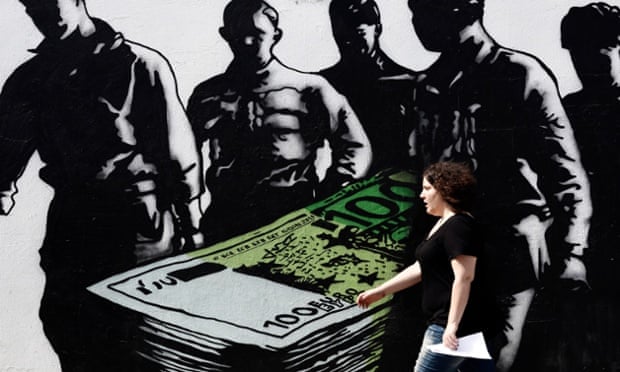Larry Elliott Economics editor Friday 19 June 2015
Analysis: Alexis Tsipras and his negotiators are not playing by Europe’s established rules – and a Grexit could end up hurting the EU more than them
Pedestrian passes a graffiti artwork titled Death of euros, painted by French street artist Goin, on a wall in Athens, Greece. Photograph: Kostas Tsironis/Bloomberg via Getty Images

Greece knows it. The International Monetary Fund knows it. Every European finance minister knows it. After the latest failure to secure a deal at the meeting of finance ministers in Luxembourg, the crisis is coming to a head.
The unescapable facts are that between Monday and Wednesday, some €2bn (£1.43bn) left the Greek banking system – more than the €1.1bn in additional emergency financing provided by the European Central Bank this week. The banks are losing around 0.5% of their deposits each day and cannot sustain losses of this sort. They are on the brink of collapse.
Greek public finances also look dire, with tax revenues 24% below target in May. The government is balancing the books – but only by not paying its bills.
There will be an emergency summit of Eurozone leaders on Monday, but by then it may already be too late. Capital controls look inevitable to stem the outflow from the banks and could be needed before the weekend after the latest setback. Athens has already said it will be unable to pay the IMF at the end of the month unless it gets some immediate financial assistance.
There was little evidence in Luxembourg of a deal, no sign even that either side was adopting a more emollient approach. The idea that Greece might be offered a grace period after its debts become due to the IMF was rejected by Christine Lagarde. The fund’s managing director could not have been clearer: “I have a deadline, which is 30 June, when a payment is due from Greece. If 1 July it’s not paid, it’s not paid.”
Meanwhile in Athens, the government said it was preparing for the return of the drachma. “If we are forced to say the big no, the difficulties will last for a few months”, said the social security minister, Dimitris Stratoulis. “But the consequences will be much worse for Europe.”
This is a reasonable point. Throughout the crisis, the IMF, the ECB and the European commission have been negotiating from what they perceive as a position of strength. That’s because traditionally debtors do what creditors tell them. But not this time.
There have been four big factors that have allowed Alexis Tsipras to run rings round Angela Merkel. The first is that being flat broke can sometimes help. When a country has suffered as much as Greece has in the past five years, telling it that life will be awfully bad outside the Eurozone is not that much of a threat.
Tsipras’s second big advantage is the risk that a Greek default followed by a Greek departure from the euro would cause collateral damage. For the past six months, the commission and the ECB has been insisting that Europe is in a much better position to cope with a Grexit than it was two or three years ago. The ECB has a mechanism for providing help if the financial markets threaten other Eurozone countries seen as vulnerable. The Eurozone economy has returned to growth.
This, though, has always looked overoptimistic. Once one country has gone from the euro, there is no reason why another should not follow. As soon as one of the remaining members of the single currency ran into trouble, it would be dubbed the “next Greece”. And there are countries that would be contenders for that role: Italy is one – where per capita incomes are no higher than they were at the end of the 1990s and the debt burden onerous.
Tsipras and his finance minister, Yanis Varoufakis, have played this game of chicken with some skill. Sure, they have said to the troika, you can pull the plug on us. But by doing so, you are likely to cause damage to both the European and the wider global economy. Greece could be to 2015 what Lehman Brothers was to 2008. Are you ready for that?
The way Greece has negotiated has been the third factor in their favour. Europe has always worked on a fairly consensual basis, with ministers from the centre right and the centre left getting together to do deals. Poses are sometime struck, but that is always a prelude to a bit of give and take.
Tsipras and Varoufakis have played by different rules. They come from a different, radical left political tradition and have stuck to their argument that Greece has suffered enough punishment. They know that the Syriza coalition would be finished if it buckled to the demands of the troika. One comparison is with Ken Livingstone in the 1980s, a charismatic figure who took great delight in tweaking the nose of the Thatcher government.
In the end, Thatcher dealt with her Livingstone problem by abolishing the GLC. The fourth big thing Tsipras has going for him is that he knows Merkel is reluctant to do what would be the equivalent: kicking Greece out of the euro. She does not want to be the German chancellor who puts European integration into reverse.
A deal is still possible, although the chances of an almighty mess are getting bigger by the hour. Jeroen Dijsselbloem, president of the Euro group, said after the Luxembourg meeting that it was up to Greece to come up with credible proposals, but if anybody is going to blink on Monday the smart money should be on the creditors. As Bob Dylan once said: “When you have nothing, you have nothing to lose.”
Why Greece might now have the upper hand in crunch talks | World news | The Guardian
![The [Greek] European Tragedy](https://blogger.googleusercontent.com/img/b/R29vZ2xl/AVvXsEiWKI5s90SFm1wWTk6bs4p7CgslaC2SnYPsrZhb-B-smOufNNCSxCvpBLI9hOB-LsXZjir_PNmEiMk2-E62F3xkg96IoC6QFAaZAnPRTVH340IN9WBRmWJqPkjWlgyRj3zpALp7h6hvA58/s920/GkBack_new.jpg)